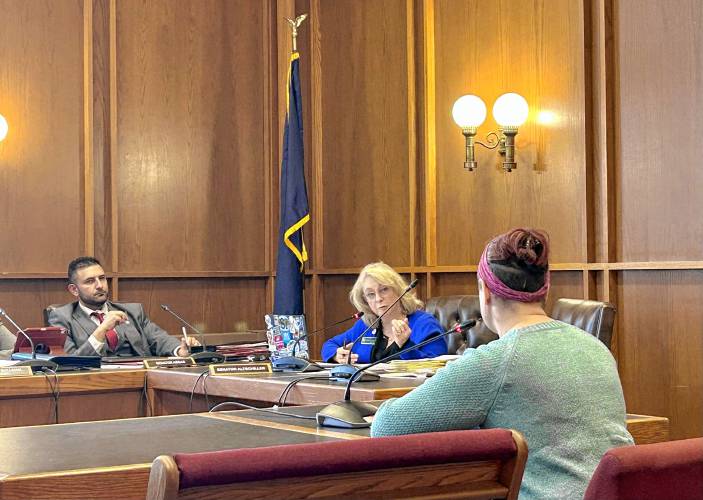Lawmakers go toe-to-toe on school library policies, complaints

Merrimack resident Heather Robitaille (right) discusses potential school library policies with senators Debra Altschiller and Daryl Abbas. Charlotte Matherly—Concord Monitor
| Published: 02-18-2025 5:42 PM |
Heather Robitaille hadn’t realized her daughter felt different from her peers when she first got glasses at age 4 – until they read a book together that featured a bear that wore glasses.
“Her face lit up and she said, ‘They’re just like me!’” said Robitaille, who lives in Merrimack. “Because she was able to see this book, she made that connection and felt seen. It was really powerful.”
She imagines that for kids with other experiences, it must be difficult knowing that some parents and school boards want to take away books that represent them. In the past few years, book bans have swept the country as some parents demand more restrictions and oversight on what content students are allowed to consume in school. Those who oppose these book bans argue that many of them target certain topics and identities, such as LGBTQ people.
New Hampshire lawmakers are looking to join the fray. They just have completely different ideas of how to do so.
The Senate Education Committee considered two competing bills on Tuesday. Both would have local school boards enact policies regarding the content in school libraries and the complaint process, should someone dispute the material’s appropriateness for children.
Senate Bill 208, which is supported by Democrats, aims to get ahead of book-banning efforts and “censorship” in New Hampshire by outlining that “diverse points of view” must be available in library collections. It’d also bake in legal protections for librarians and teachers.
Senate Bill 33, backed by Republicans, focuses more on parents’ rights in the selection and complaint processes. Monadnock-region Sen. Kevin Avard said he wants parents to have the “right to speak up” without being “demonized” and argued that’s all his bill would do.
The legislation would provide an official process to object to any materials or presentations in public schools – everything from a class worksheet to school assemblies – that anyone argues includes content that’s “harmful to minors, age-inappropriate, or otherwise offensive or inappropriate.”
Article continues after...
Yesterday's Most Read Articles
 Twelve acres near Concord Walmart cleared for future retail development
Twelve acres near Concord Walmart cleared for future retail development
 When N.H. lawmakers refuse to vote with their party, it comes with political consequences
When N.H. lawmakers refuse to vote with their party, it comes with political consequences
 ‘Financially vulnerable’: Years of missteps led up to Merrimack Valley overspending by $2 million last year
‘Financially vulnerable’: Years of missteps led up to Merrimack Valley overspending by $2 million last year
 Skeletal remains near I-393 identified as Concord man, 36
Skeletal remains near I-393 identified as Concord man, 36
 Program offers discounted golf rounds for young players at Concord’s Beaver Meadow
Program offers discounted golf rounds for young players at Concord’s Beaver Meadow
 ‘New Hampshire is just going to embarrass itself’: Former Child Advocate warns against proposed office cuts
‘New Hampshire is just going to embarrass itself’: Former Child Advocate warns against proposed office cuts
Parents “have a right to make their objection known without being bullied, without being traumatized, by the system,” Avard said. “They have a right to speak up, make their voice known, and if their voice is rejected then so be it, but this gives them that privilege and right to speak up and use the process.”
Previous attempts to regulate from the state level which books or materials are allowed in local schools have failed, while many districts already have review and complaint policies in place. School boards also accept public comments from parents and community members during meetings.
Some educators’ associations and former teachers worried that Avard’s bill was too broad and could lead to confusion or a chilling effect on teachers, discouraging flexibility and responsiveness from teachers.
It gave loose guidelines on library curation, simply saying that school districts would need to write a policy describing what kinds of materials are allowed in schools. The Democrats’ bill, proposed by Sen. Debra Altschiller, would have those policies be made with the input of library and school board associations.
As for complaints, each bill would establish a review process. Altschiller’s would have requests for removal of materials go toward a committee appointed by the local principal. The committee would make a recommendation to the school board, which would then make the final call. The book or material in question would stay in schools until the final decision was reached.
Avard’s bill would put that power in the hands of the principal, who would decide if the material was harmful to minors and whether to remove, restrict or modify it. If the person who complained is unsatisfied with the principal’s decision, they could then appeal to the school board.
Charlotte Matherly is the statehouse reporter for the Concord Monitor and Monadnock Ledger-Transcript in partnership with Report for America.







 Photos: Signs of spring
Photos: Signs of spring 25-year-old Concord man identified as Steeplegate Mall RV fire victim
25-year-old Concord man identified as Steeplegate Mall RV fire victim Concord streets to close for Rock’N Race
Concord streets to close for Rock’N Race
